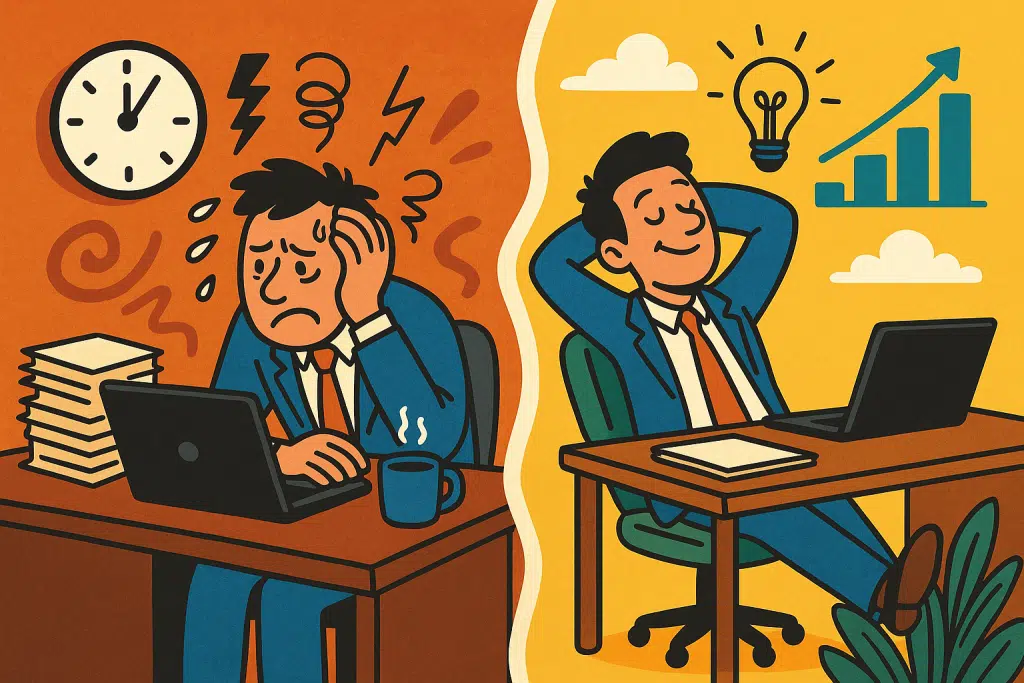Why Reducing Stress Leads to Better Work Results
Charlotte Stone August 6, 2025
Let’s get something straight: stress isn’t proof that you’re working hard. It’s proof that something’s off.
Yet, for years, we’ve glamorized burnout. Hustle culture told us to rise and grind while chugging caffeine and ignoring blinking inboxes. But here’s the twist—research keeps confirming what our bodies have been screaming: chronic stress doesn’t make us more productive. It does the exact opposite.

In fact, reducing stress leads to better work results. Not marginally. Significantly.
And in today’s hybrid/remote/always-online work culture, the conversation has shifted from “How much can you take?” to “How well can you recover?” Companies are catching on, but as individuals, we’ve still got work to do on ourselves.
What Stress Really Does to Your Productivity
Think of stress like a browser with 43 tabs open. Some of them are frozen. Some are playing music. And you’re not even sure which one is making your laptop fan sound like a plane engine.
That’s your brain on stress. You’re technically working, but everything is lagging.
Here’s what’s actually happening when stress levels are high:
- Cognitive performance tanks. A study in the Journal of Neuroscience found that high cortisol (the stress hormone) directly impairs memory and learning.
- Focus shrinks. You become reactive, not strategic. Everything feels urgent. Nothing gets done well.
- Creativity dries up. The prefrontal cortex, which fuels innovation and decision-making, goes into low-power mode when your brain is in fight-or-flight.
Translation: You’re not doing your best work when you’re fried. You’re doing survival-mode work.
Emerging Trends: Why the Workplace is Finally Taking Stress Seriously
Reducing stress isn’t just a wellness trend—it’s becoming a productivity strategy. Here’s what’s shaking up the culture:
1. The Rise of the “Slow Productivity” Movement
Thanks to Cal Newport’s viral essays on “slow productivity,” there’s a growing rebellion against being chronically busy. Instead of cramming your day with tasks, the focus is now on deep, meaningful, sustainable work.
- Fewer tasks
- More focus time
- Better output
This shift is backed by real productivity research, not just lifestyle blogs. Companies like Microsoft Japan tested a 4-day work week and saw a 40% increase in productivity [Microsoft Work-Life Choice Challenge 2019].
2. Mental Health Days Are Becoming Normalized
In 2024 alone, over 45% of HR departments reported offering paid mental health days—a quiet revolution that recognizes recovery as part of performance.
3. Biometric Stress Tracking Is on the Rise
Wearables like WHOOP and Fitbit are now tracking HRV (heart rate variability) to measure stress in real-time. Even workplace software is integrating biofeedback data to optimize break schedules and task planning.
So yes, stress reduction is having its moment—and it’s not just a self-care thing. It’s a work results thing.
How to Actually Reduce Stress (Without Moving to a Cabin in the Woods)
Now that we know why reducing stress leads to better work results, let’s talk about how to make it happen. No yoga mats or scented candles required.
1. Redesign Your Breaks
Skipping breaks isn’t a power move—it’s a mistake. But not all breaks are created equal.
- Scrolling Instagram? Not a real break.
- Taking a 15-minute walk with no phone? That’s gold.
According to Stanford research, people who took “awe walks” in nature were significantly more focused and less anxious than those who didn’t [Sturm, et al., 2020].
Try this: Use the 52/17 rule—52 minutes of work, followed by 17 minutes of actual, tech-free rest.
2. Master the Art of the “Transition Ritual”
If you work from home, you probably go from emails to dishes to meetings to laundry like a human ping-pong ball. This causes mental fatigue.
Introduce transition rituals between work and rest. These small cues signal to your brain that you’re switching modes:
- Light a candle
- Change clothes
- Play a specific song
- Walk around the block
They sound small. But they stack up, big time.
3. Reflect Instead of React
We’re so busy trying to “finish things” that we forget to think about whether we’re even doing the right things.
Enter: Work Journaling.
No, not the “dear diary” kind. Just 5 minutes at the end of your day to reflect on:
- What drained your energy?
- What gave you momentum?
- What should you do differently tomorrow?
The Harvard Business Review found that employees who engaged in daily reflection saw a 23% performance boost over those who didn’t. Just from thinking. [Di Stefano et al., HBR, 2014]
Focus Is the New Currency: Why Stress Reduction Is Mission-Critical
We live in an attention economy. But our focus is being sold to the highest bidder—notifications, emails, Slack pings, doomscrolling…
When you reduce stress, you reclaim focus. And focus is where the real magic happens.
Focus fuels:
- Strategic thinking
- Deep work
- Flow state
- Problem-solving
- Creativity
And it’s only possible when your brain isn’t being hijacked by cortisol and adrenaline.
Working from Home: Friend or Frenemy?
Let’s talk about the elephant in the room: working from home.
Remote work can be amazing for reducing commute stress and increasing flexibility. But without boundaries? It becomes an all-day stress buffet.
Tips for reducing stress while working from home:
- Create a designated workspace—even if it’s just a corner.
- Set “fake commutes” to walk before/after work.
- Use a shutdown ritual: at a set time, close the laptop and walk away.
- Don’t “task switch” between house chores and job tasks. Batch them.
You have to design your home life to protect your focus—because no one else will.
Small Shifts That Compound Over Time
Stress reduction isn’t one big fix. It’s a dozen small tweaks done consistently.
Here’s a checklist of things that can lower your stress and raise your work results over time:
Daily:
- Drink water (seriously, dehydration mimics stress)
- Move your body—brief walk, dance, stretch
- Breathe deeply (box breathing for 2 minutes)
- Take real breaks
- Reflect on your workday
Weekly:
- Journal or brain dump
- Have one no-meeting day
- Plan your week with margin—not back-to-back chaos
Monthly:
- Take one “white space” day—no work, no productivity, just rest
- Audit your tasks: what’s busywork vs actual results?
Real Talk: You Can’t “Hack” Your Way Out of Chronic Stress
You can try productivity hacks, download apps, or time-block your calendar into a Picasso painting—but if your baseline is stress, you’ll still struggle.
This isn’t about working harder. It’s about working wiser.
Stress makes you sloppy.
Rest makes you sharp.
And we’re finally in a work era where reducing stress isn’t optional. It’s the competitive advantage.
Final Thoughts
Stress isn’t a performance enhancer. It’s a silent productivity killer.
If you want better results at work, more clarity, and fewer mistakes? Start by giving your nervous system a break. Reflect more. Breathe deeper. Take smarter breaks. And stop treating burnout like a badge of honor.
Because the truth is, reducing stress doesn’t make you lazy. It makes you lethal—in the best possible way.
References
American Psychological Association. (2023). Work and Well-being Survey: Nearly 3 in 5 employees report negative impacts of work-related stress.
https://www.apa.org/news/press/releases/stress/2023/workplace-well-being
Harvard Business Review. (2022). The Burnout Crisis: How leaders can help employees thrive.
https://hbr.org/2022/03/the-burnout-crisis-how-leaders-can-help-employees-thrive
Forbes. (2021). Why reducing workplace stress is the key to better productivity.
https://www.forbes.com/sites/bryanrobinson/2021/06/20/why-reducing-workplace-stress-is-the-key-to-better-productivity/







